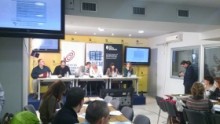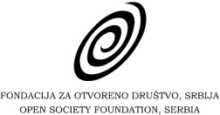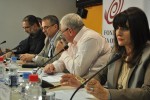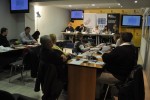07. 11. 2014
ANEM Round Table “Relationship between Media and Judiciary”

ANEM organized this round table because it is of opinion that the implementation of reforms in the media sector, creation of a more favorable media environment and the improvement of the media and journalists' position requires finding solutions for the problems that have been a burden to the media sector for a while. Among the problems are those of the mutual relationship between the media and the judiciary. Therefore, the aim of the event was to initiate dialogue between the media sector and the judiciary about the said problems and possible ways of overcoming them, and with the aim to contribute to the establishment of constructive cooperation between the media and the judiciary.
The Round Table was organized within ANEM project "Legal Monitoring of the Serbian Media Scene", financially supported by the Civil Rights Defenders and the Open Society Foundation, Serbia.
Case-law as a source of media law in Serbia
Judge Dragica Popesku, PhD, first pointed out that in Serbia courts reach decisions based on the Constitution, laws and other general acts when envisaged by law, according to widely accepted rules of the international law and international treaties, in accordance with the Constitution of the Republic of Serbia that guarantess independence of courts. Case law in Serbia is not a formal source of law according to the Constitution, althought it practically becomes so when courts use a certain court decision as a model for future acting, that is when they apply legal solution from the decision as a rule upon which they resolve further cases. In the case of a legal vacuum - when certain life situations are not covered by a legal norm, or when a situation is regulated by norms of the same rank, but different content, which are in mutual collision, such situations are resolved by setting rules most appropriate for given cases. In the situation when a court creates law and when a certain court decision in fact creates a new norm, a rule often emerges that other judges and courts decide to act upon.
However, the key question that arises then is how justified it is to use case law as a source of law, and whether it is should be allowed to a court to apply only formally recognized sources of law and to each judge to interpret and apply the law in the manner in which he/she understands and interprets it. Namely, it could happen that later regulation brings a change with an entirely different solution, which creates a problem as some decisions will be annuled while they have been confirmed until then, and this causes legal insecurity. Even greater problem arises by creation of so called negative case law, that is taking as a model decisions based on wrong interpretation of existing norms, when such interpretation is later changed and a new stance is taken. This issue also pertains to a case when a court stance is correct from the point of view of the interpretation of a legal norm since uncertainty remains if a judge is obliged to act upon the stance or upon a precedent (a judgment which for the first time solves a particular case that will oblige courts further on to act in the same manner in future disputes containing the same or similar case - the source of law in the countries of the Anglo-Saxon legal system), or a judge can act upon his/her discretion or personal understanding, that is understanding of a legal norm, and whether this creates legal insecurity or it shows that each case is a separate matter, although a norm regulating such situation is unique with its strict content and it is generally binding, but interpreted differently.
Judge Popesku further stated that that a stance passed by a general session of a civil deparment of a court is binding for the court, but not for a court of a lower rank. However, in reality stances of court practice are applied en masse, particularly those of high courts, for the simple reason to prevent annulment of decisions of judges of lower courts. However, there is always the issue of correctness of decisions made in a such a manner or the correctness of the stance a court of higher instance assumes, because it happens that norms are not properly interpreted even then. Judge Popesku stated the example of the right to appeal for indemnity of pecuniary and non-pecuniary damage in the case of breach of the right to privacy - the right to privacy or the right to personal records, based on the Article 46 of the Law on Public Information from 2003. She said that the stance of the case law that non-pecuniary damage due to the breach of personality rights in the media should be low and that every breach of personality rights equals damage is wrong becuase our positive law does not say so; she deemed inaccurate the interpretation of the provision of the Article 46 of the Law on Public Information stating that in the case of the breach of the right to private life one can demand indemnity of non-pecuniary damage by appealing against the editor of the media only (and not against the founder - media publisher, or journalists as information authors) because they are jointly responsible, and that the indemnity may be requested without establishing whether the damage was incurred because the indemnity of non-pecuniary damage can be fulfilled only if the damage exists.
Finally, judge Popesku stated that the new Law on Public Information and Media unified the responsibility of editors, journalists and media publishers for indemnity of damage incurred by publishing information the publishing of which is forbidden by this law. She also said that it may be useful if future law (de lege ferenda) envisages possibility that the aggrieved party requests compensation for the mere breach of the right, as a declarative establishment of the breach, in which case the monetary compensation would not be of significant importance, while the indemnity of non-pecuniary damage, if the damage really exists (which would be established in court proceedings), could be awarded as a significant sum of money in order to present an adequate satisfation.
Relationship between media and judiciary from the point of view of judiciary
Judge Omer Hadžiomerović pointed out that the similarity of media and judiciary is in the fact that they both have control function over the authorities. Media also control judiciary, which is an important role of the media as judiciary is the only branch of government that is not controlled by two other branches. Independence of the media and judiciary is necessary for the performance of the control function. Additionally, the media perform this function successfully to the extent that they present public opinion - the problem arises when they merely form public opinion, Hadžiomerović said.
Relationship between the media and judiciary depends on their lack of bias, professionalism, expertise and public trust they enjoy, Hadžiomerović thinks. The important question is how media behave when reporting on specific court cases or developments within judiciary that are of public importance. There is often a problem of understanding the truth, which the media and courts are tasked with establishing, because court truth and media truth do not necessarily have to be the same since different methods are used to arrive at it. Thus the public is often presented with one view by the media and another in court proceedings, he said.
According to Hadžiomerović, media have the right to comment on court proceedings, but the question is how they do it (starting from the vocabulary they will use). He is often of the impression that journalists comment on some court decisions without having read them or without having followed the court proceedings. As for reporting information from trials, media should not impart only basic information, but the information has to be processed in order to get additional quality, it should be placed into context, which all requires the knowledge of court proceedings, functioning of the court system, its obligations and problems - not only so that journalists would pose questions to a court, but also to those who comment on court proceedings, particularly representatives of the other two branches of government. Otherwise, ignorance is easily manipulated, said the judge Hadžiomerović.
Hadžiomerović is of opinion that the role of judges is to help media, to point the media attention to problems of public interest. Also, in order for the media to help judiciary and vice versa, it is very important that judiciary understands the problems of the media, starting from the basic one - what information they need. When courts fail to supply some information to journalists, the journalists will look for it in other places, and that is how the courts sometimes contribute to unobjective reporting, Hadžiomerović concluded and stressed the need for the courts to open up towards the media.
Relationship between media and judiciary from the point of view of the Public Prosecutor's Office
Goran Ilić explained three angles of viewing the relationship between the Public Prosecutor's Office and the media. The first angle pertains to the range of information that the Prosecutor's Office can offer to the media regarding criminal proceedings. There are often misunderstandings with the media in this domain, said Ilić. Regarding this issue, he explained that the Public Prosecutor's Office practice is based on three important criteria. The first criterion is determined by the Law of Free Access to Information of Public Importance that defines situations in which the Prosecutor's Office and other bodies involved in criminal proceedings are not in a position to provide information. These limitations should enable unhindered course of preliminary and criminal proceedings and it is established for each individual case whether public prosecutor may offer certain information to the media. The second criterion is privacy. Regarding provision of information pertaining to criminal proceedings there has to be a balance between public interest (to know certain information from the criminal proceedings) and the need to protect privacy. One should bear in mind that there are several levels of the privacy protection. Persons of general interest to the public, such as politicians and public office holders, enjoy the least degree of privacy protection, while there are persons who enjoy absolute privacy protection, such as parties in criminal proceedings. In the latter case, the Prosecutor's Office should avoid providing personal information about these persons. The third criterion is the presumption of innocence, which is the basic principle guiding the Public Prosecutor's Office in providing information from criminal proceedings, Ilić explained.
The second angle of viewing the relationship between the Public Prosecutor's Office and the media is the media reporting on the Prosecutor's Office, on the topics important for explaining the work of public prosecutors in specific cases or the work of the Public Prosecutor's Office in general. The example of this is the situation in which the Public Prosecutor's Office found itself after the new Criminal Code came into force recently - numerous competencies were shifted from the courts to public prosecutors although there are not enough resources (personnel and funds), due to which proceedings are mainly inefficient. Also, another problem is that prosecutors and their deputies are overburdened with numerous cases. Additionally, the problem is the manner of electing prosecutors, as defined by the Constitution. However, as Ilić said, these issues are hardly ever mentioned in the media.
The third angle pertains to the relation between freedom of expression and the protection of human rights. Defamation was decriminalized in Serbia recently, while many other crimes agains dignity and reputation remained in the Criminal Code, which Ilić thinks is an absurd situation. He presumes that decriminalization of defamation was motivated by the protection of freedom of expression. „Has decriminalization of defamation contributed to better quality of the freedom of expression? I am afraid not", said Ilić adding that wrong conclusions regarding this issue are suggested to the public - for instance, one could hear, particularly from journalists, that defamation is not common in the European case law, which is not so, said Ilić and explained that the case law of the European Court for Human Rights features numerous judgments indicating that punishment for defamation is an intervention necessary in a democratic society (with many limitations, naturally). Unfortunately, we face defamation in our criminal proceedings daily, said Ilić and expressed his concern that decriminalization of defamation in Serbia was premature for our legislation and that it has not produced good results. As Ilić said, it seems that the balance between the protection of freedom of expression and the protection of other human rights, such as the right to reputation, honor, dignity - has shifted at the expense of the latter rights of individuals.
Tabloidization of media and judiciary
Vukašin Obradović expressed his opinion that the phenomenon of tabloidization is extremely important for the judiciary, judges and prosecutors because the tabloids ruin the reputation of the judiciary. They assume the roles of the prosecution and courts - they „sue" and „pronounce judgments" even before the institutions perform their role, said Obradović adding that this consitutes a system of pressure on the work of the prosecution and judiciary. Journalism profession takes measures against such media reporting, Obradović said, but his impression is that those who are real victims of such „journalism" - primarily judges and prosecutors - do not voice their concern regarding this problem.
Another problem that Obradović pointed out is that some media outlets have preferential treatment by individuals in the judiciary. Tabloids could not exist if they did not receive from the judiciary, the police and other institutions information that should not be made public, he said and added that he did not notice that judiciary initiates internal investigations to establish how such information is made public.
Obradović concluded that tabloidization is a very serious problem that Serbian judiciary and the media should face because dialogue about it is persistenly being avoided.
Zorana Delibašić, judge of the Appellate Court in Belgrade, asked how tabloidization can be prevented and what judiciary can do towards this goal. She also stated her idea that every judge who has a case of public interest could revise it with the court spokerperson and thus offer some good topics to the media. The media mainly insist on criminal proceedings featuring very well-known names, but there are also „simple" topics of interest to ordinary citizens that the media could report on, but they do not do it properly, said Delibašić and cited as an example the topic of protecting marginalized groups from discrimination and the topic of family violence. She said that she had not encountered media reporting about court proceedings in such cases, involving, for instance, information that a court extended protection to a family violence victim.
Vukašin Obradović responded that courts and the Prosecutor's Office can fight tabloidization by being fully open towards the media within legal limits, and that they should also take responsibility for so-called „leaking" of information that influences public perception of judiciary and court proceedings. Therefore the courts must establish a precise limit which they may reach in communication with the public and they must hold responsible judges and prosecutors who exceed this limit, Obradović said.
Answering the question of Vesna Miljuš, judge of the High Court in Belgrade, who asked what the Independent Journalists' Association of Serbia (NUNS) does about tabloidization, Obradović explained that two mechanisms are at its disposal. One mechanism are courts of honor in journalists' associations, that are, according to his opinion, an obsolete form of protecting journalism profession. The other is self-regulation, more precisely the Press Council, the body only four years old, that decides through its Complaints Committee if the journalists' ethical code is violated. However, Obradović added, an additional problem is that tabloidization in Serbia is not only a professional, but also political issue.
Media and judiciary - partners or opponents?
In his speech, Nedim Sejdinović first addressed the problems that are common to the media and the judiciary. He said that problems in the media and in the judiciary are featured prominently in reports assessing the state of human rights in Serbia or the progress in the EU integration process and they are recognized as a hindering factor in improving social, political and economic situation in the country. Further on, what they hold in common is that they can be the most important corrective factor or an obstacle to the abuse of power, while if abused, they can be one of the most significant leverages for uncontrolled exercise of power, he said. They also hold in common frequent and cursory assessment by citizens that they are the cause of or the main culprit for social and political turbulence, Sejdinović said and added that they are merely the most visible parts of a much more serious social and political problem. He stated his opinion that the worryingly high level of mistrust of citizens in courts and the Prosecutor's Office are a consequence of media reporting that is evidently under government control.
However, as Sejdinović said, media and judiciary are natural partners in the fight against numerous social deviations, such as crime, corruption, abuse of power etc, and their relationship is much more complex than mere reporting about court proceedings and judgments. Media can put pressure towards fostering the work and professionalization of judicial institutions and strengthening their independence by means of passing systemic laws; they can educate citizens about court proceedings and functioning of the judiciary in general; and they can also act preventively, by creating the environment and value system in which crime and corruption will be socially undesirable.
Drastic violation of ethical standards in the media has become a rule, particularly lack of respect for presumption of innocence, Sejdinović said. However, one should not neglect the insufficient education of journalists about the work of the judiciary, the fact that many media outlets do not have the capacity to professionally report on court proceedings and developments in the judiciary, and corruption in some tabloid media, he said.
As for the relation of judiciary towards media, Sejdinović thinks that the publicity of the work of courts is not only a legal obligation, but also the best way for the protection of judiciary. However, judiciary in Serbia more often defends itself from the media than it opens itself up to the media, he said. Sejdinović thinks that judiciary should undertake a series of steps, including spokespersons choosing the cases that could be interesting to the public and devising a strategy for accessing the media with the information about such cases. Good relationship with the media also means knowing routines and problems they face daily, including their lack of competence or lack of beat journalists that could cover judiciary, Sejdinović said.
The media can be a tool in the hand of the authorities for the fight with the judiciary, while the courts can be a tool for the fight against insubordinate media and media freedoms, Sejdinović said and added that there are numerous examples of this, while the most telling is the one from late 1990s pertaining to the implementation of the draconian Law on Public Information that brought some media to the verge of existence and shut down some media outlets.
Discussion
Judge Omer Hadžiomerović pointed out as interesting the question of who should and could act towards preventing tabloidization and related phenomenon of „leaking" information. He said that journalists' associations do act, while within judiciary only the Judges' Association acts as there is no institutional framework for such action. He also noted that the role of the prosecution has changed with the new Criminal Code and that, therefore, the role of the prosecution in relation to the media should also change - while the prosecution used to be a party in court proceedings, it is now also a body leading investigation and it should act towards the media accordingly.
Zorana Delibašić, a judge of the Appellate Court in Belgrade, asked the NUNS president Vukašin Obradović what the role is of the self-regulatory body and what journalism profession can do to improve the quality of the media and stop tabloidization. Obradović explained the structure and the work of the Press Council and stressed that the Council is in the process of establishing itself as a self-regulatory body as it is only four years old. He said that the goal is that the media publish decisions of the Press Council's Committee on the violation of journalists' code of ethics because that is the way to raise awareness among citizens on deciding which media outlet to turn to, and it is up to the media outlets to decide whether they will change. Apart from the Press Council and court appeals, there are no additional mechanisms, said Obradovič and pointed out that what the media and the judiciary can do jointly is to try to protect journalism profession from those who violate the ethical code, and the judiciary can tackle the issue of information „leaking". Nedim Sejdinović of NDNV added that the importance of the Press Council is increasingly recognized judging by the increasing number of appeals filed to it; however, the media often do not publish the decisions of the Press Council's Committee. He also stated that the Regulatory Body for Electronic Media is in charge of the regulation of electronic media.
Judge Dragica Popesku said that education would be a solution for journalists who are not trained enough to report from courtrooms, but that education of judges who deal with media cases is also needed and it should be focused on journalism and communicology. This means that media and judiciary should cooperate and organize joint events where journalists could present their problems and ask judges and prosecutors how to solve them, and where media and judiciary could exchange experiences. Several participants positively reacted to the idea of education considering it needed, and thus the need for education surfaced as the key conclusion of the event. ANEM Coordinator Jasna Milanović said that ANEM had recognized the need for education early on and that this event was organized with education in mind, as well as that ANEM plans, through a series of round tables, to continue to work on the education and strengthening judiciary and media for conducting mutual dialogue and solving problems in their relationship.
Nedim Sejdinović of NDNV asked the lawyers present at the event for their opinion on whether it is good that NDNV recommends its members who are sued for their articles to turn to the Press Council, as NDNV is of the opinion that a defendent in a court proceedings could be helped if the Press Council decided that he/she did not violate the ethical code. Judge Dragica Popesku explained that the respect for the ethical code does not mean da respect for personality was not violated. Even if the published information is true, journalist must pay attention to the type of information. If it pertains to the right to privacy, no matter the fact that it is true, it can be painful and harmful for the person in question, it could be information that must not be made public due to the interest of criminal proceedings, or the information may influence the public opinion in the environment where the person lives or works, said Popesku. A recommendation to a journalist to apologize for a violation may be productive with respect to reducing the compensation for the damage, particularly non-pecuniary damage, in a proceedings before a civil court, said Popesku. However, she added that the fact that it is established that someone did not violate the ethical code does not mean that a court will not establish a violation of a right.
Judge Omer Hadžiomerović stated his opinion that it is not good that defamation was decriminalized and that courts contributed to such a development. He is of opinion that reputation, as a social value, deserves criminal protection, and that the problem arose not in the law itself, but in the manner the courts interpreted it and implemented it in media-related cases. His opinion is that judges need to be educated, that they need to be informed about judgments of the European Court for Human Rights and that they should not interpret norms literally, which is often the case.

The contents of this article are the sole responsibility of the authors and do not necessarily reflect the views of the Civil Rights Defenders.

The contents of this article are the sole responsibility of the authors and do not necessarily reflect the views of the Open Society Foundation, Serbia.
-
Photo: Media Center
-
Photo: Media center
-
Photo: Media Center
-
Photo: Media Center
-
Photo: Media Center
-
Photo: ANEM
-
Photo: ANEM
-
Photo: ANEM
-
Photo: ANEM
-
Photo: ANEM
-
No comments on this topic.










